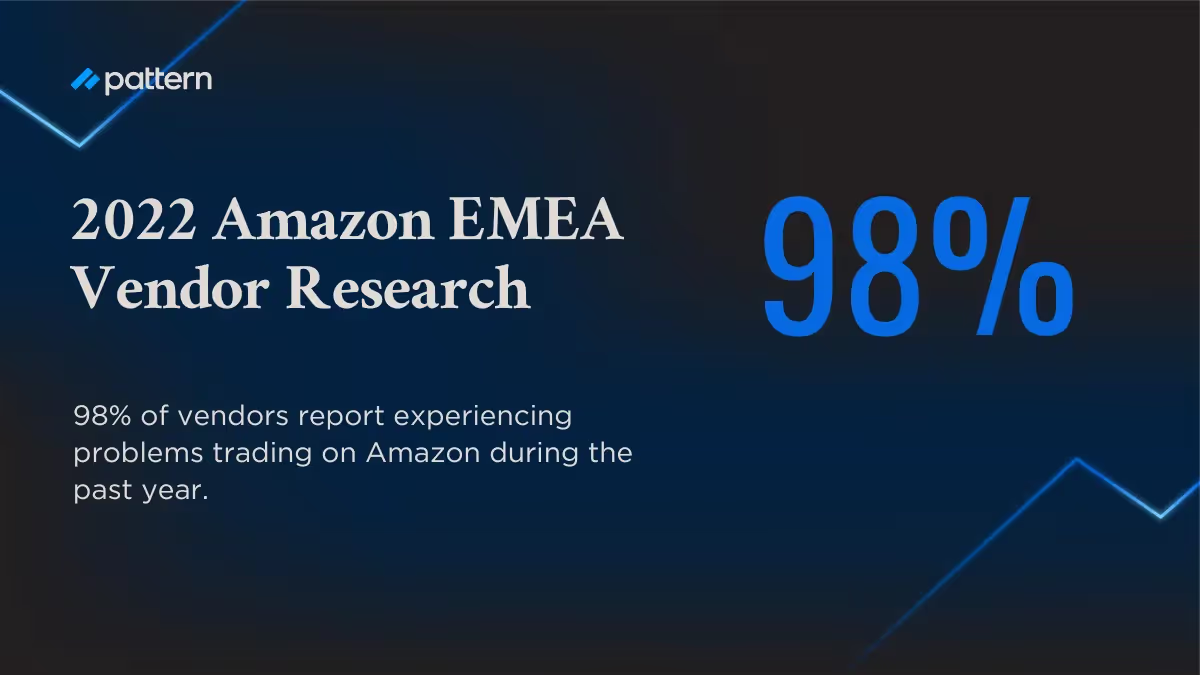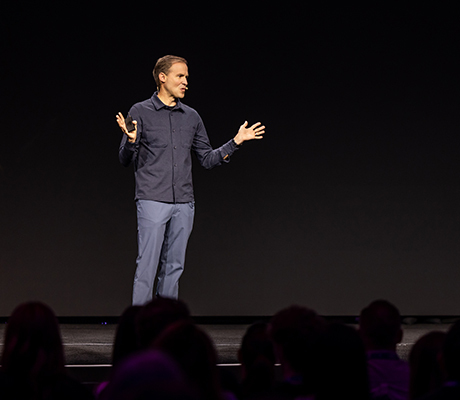Half of Amazon EMEA Vendors Likely to Switch Selling Models in 2023

Margin pressure, challenging logistics, and inability to forecast currently impacting 98% of vendors.
LONDON — Profitability challenges, complex logistics, and difficulty forecasting sales are major pain points for consumer brands that sell via Amazon in Europe and the Middle East (EMEA)—according to new research from Pattern, the category leader for global ecommerce acceleration.
Pattern’s newly completed Amazon EMEA vendor analysis surveyed nearly 100 brands in EMEA to learn more about their Amazon sales activity, current challenges, and plans for the future on the rapidly expanding marketplace. 98% of vendors in the survey reported experiencing problems trading on Amazon during the past year, including:
Pricing and Profitability Challenges
Price erosion is the most common pain point experienced by brands in EMEA during the past year, with 64% of respondents citing them as “extremely” or “quite painful”. Nearly half of vendors reported experiencing unfavourable commercial terms, while only 6% of respondents said discounting on Amazon hasn’t caused issues on other channels.
Complex or Expensive Logistics
52% of respondents said that complex or expensive logistics are “extremely painful” or “quite painful”. 51% reported experiencing increasing chargebacks, and 52% have faced issues getting products into Amazon’s warehouses; of those 43% cited disruption to their own supply chain as the root cause.
Difficulty Forecasting Sales
46% of brands surveyed reported having difficulty forecasting sales, 38% say that their forecasting methods are inadequate to keep enough stock in hand, and 37% experience high out-of-stock levels due to Amazon's algorithm-driven price.
Despite these challenges, brands still perceive Amazon as a marketplace for growth, with more than two-thirds planning to expand internationally through Amazon in the near future. Only 3% reported that they no longer intend to sell on Amazon in the future.
Despite friction, brands still have a largely positive opinion of Amazon. 51% reported feeling “very positive” or “somewhat positive” in a professional capacity, 25% are neutral. More than half the brands surveyed have not yet been able to realise a profit in EMEA. Amazon sales in EMEA have fallen for 29% of respondents, and another 23% said sales are stable.
For the future of their presence on Amazon, 41% of the brands surveyed are considering switching to a hybrid model, and 13% are considering moving from 1P to a 3P model.
“This report underscores the challenges brands still face as they attempt to capture their fair share of the $6 trillion global ecommerce market,” said Pattern Germany Country Manager and Director of Business Operations Europe Torsten Schäfer. “Profitability, forecasting, and logistical challenges are opportunities for brand partners, like ecommerce and marketplace accelerators, to play a key role in helping brands break through. Many, if not all, of these challenges can be overcome by leveraging the latest data science and global expertise. These findings make us even more bullish about the future of online commerce in EMEA.”
Methodology
Pattern surveyed 100 participants from 88 consumer brands that sell some or all of their products on Amazon in Europe and/or the Middle East between July and August 2022. All responses were verified and respondents were offered an incentive as a gesture of appreciation for their participation.All brands surveyed sell on Amazon via the three selling models; 1P (where brands sell products directly to Amazon), 3P (where brands sell on Amazon itself or work with a 3P partner), and Hybrid (where brands use a combination of 1P and 3P).
###
About Pattern
Pattern is the category leader for global ecommerce and marketplace acceleration. Since its founding in 2013, Pattern has profitably grown to more than 1,200 employees operating from 22 global locations, including Dubai, London, and Munich. Hundreds of global brands depend on Pattern’s ecommerce acceleration platform every day to drive profitable revenue growth on D2C websites and across hundreds of global marketplaces—including Amazon, Tmall, JD.com, eBay, and Noon.
As a top Amazon seller, globally, Pattern manages every aspect of a brand’s marketplace presence while providing actionable data, transparency, and real-time visibility of key success metrics. Unlike other trade partners in the region, Pattern leverages a stock-buy model that creates uniquely aligned incentives and synergies that are proven to drive accelerated growth. Unlike an agency, Pattern purchases stock from its brand partners. When brands sign up to work with Pattern, we pay them.
In addition, Pattern’s consulting team helps brands overcome strategic ecommerce challenges, including a data-science based approach that identifies where to play and which markets a brand should expand to online. To learn more, visit pattern.com.


.jpg)






